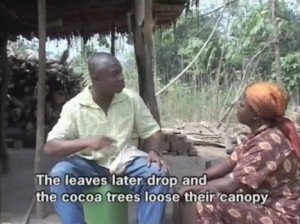 Last month, Food+Tech Connect recounted some of the challenges to scaling up farmer-to-farmer video sharing programs, as addressed by a comprehensive study. The report found overcoming language barriers, maintaining quality content, and constructing knowledge-sharing networks were all major issues for organizations hoping to quickly and easily share videos across cultures and distances.
Last month, Food+Tech Connect recounted some of the challenges to scaling up farmer-to-farmer video sharing programs, as addressed by a comprehensive study. The report found overcoming language barriers, maintaining quality content, and constructing knowledge-sharing networks were all major issues for organizations hoping to quickly and easily share videos across cultures and distances.
But improving access to instructional videos is essential in developing nations for sharing farmer knowledge. Cuts to agricultural extension programs have left agents in many countries now attempting to serve tens of thousands of farmers and many farmers do not live near farm field schools. Even when these services are available locally, women particularly face a greater barrier to accessing resources, as do illiterate farmers who are unable to read educational materials. Videos can more easily reach all of these groups, with the added benefit of presenting techniques that require visual explanation.
Fortunately, there is a considerable effort to overcome these obstacles. Many organizations design video production and dissemination programs that engage farmers throughout the process. Below, we have highlighted four of the pioneers in instructional video knowledge-sharing initiatives with photo and video samples from their projects.
* Agro-Insight works with partners like ICRISAT in several countries across Africa and Asia. First the group screens English and French-language videos to gauge interest among farmers, then they translate the scripts into local dialects. To ensure quality content, many videos feature graduates of farmer field schools demonstrating the concepts, supplemented by voice-over narrators, farmer interviews, close-ups and simple graphics when needed. VIDEO SAMPLE: Integrated approach against Striga
*The Digital Green project in India similarly includes local farmers and extension agents in the filming, production and development processes, and continuously gathers feedback from farmers to improve on quality content. Farmers speaking in local languages are filmed as they explain farming techniques, and then DVDs of these videos are distributed to local mediators who organize screenings, facilitate discussion, and answer questions. VIDEO SAMPLE: Comparison of Traditional Paddy Cultivation and System of Rice Instenification (SRI)
* The Sustainable Tree Crop Program (STCP) organizes video viewing clubs where farmers in Ghana meet weekly to watch technical videos on cocoa production, followed by discussions and field exercises with a trained facilitator. About one third of the video viewing clubs are targeted specifically toward female cocoa farmers, helping to eliminate a cultural gender bias in training programs.
VIDEO SAMPLE: Integrated Pest Management
* The Africa Rice Centre developed a series of videos on new rice technologies, including landbed preparation, seedbed preparation, seed cleaning, seed preservation and parboiling. The videos have been distributed in several countries in sub-Saharan Africa and are available in more than 30 African languages. VIDEO SAMPLE: Manually sorting clean and diseased rice seed





